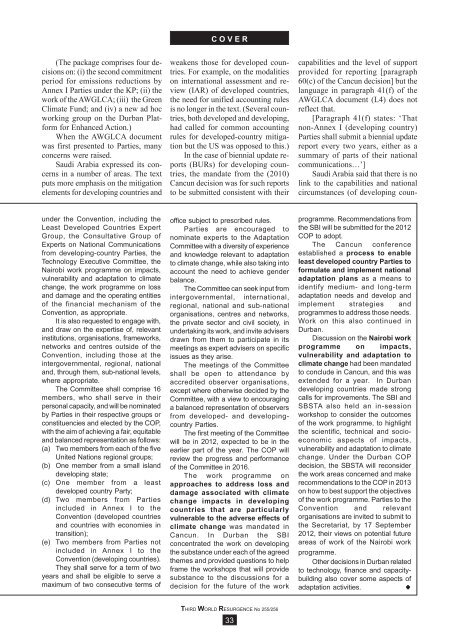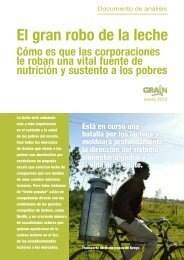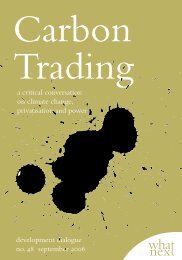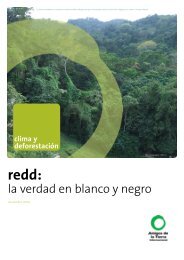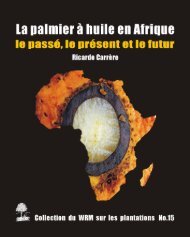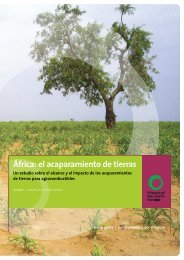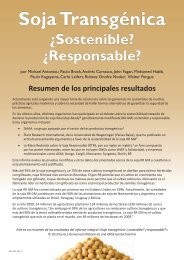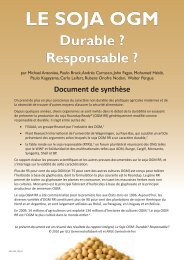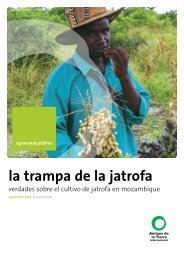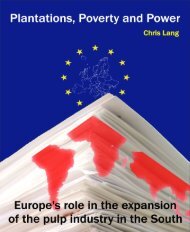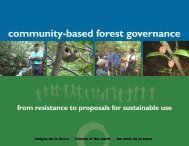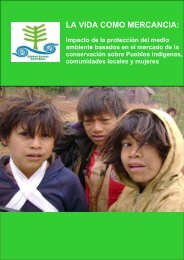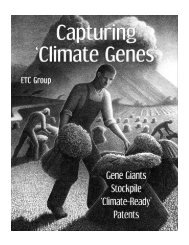Download - Third World Network
Download - Third World Network
Download - Third World Network
You also want an ePaper? Increase the reach of your titles
YUMPU automatically turns print PDFs into web optimized ePapers that Google loves.
C O V E R(The package comprises four decisionson: (i) the second commitmentperiod for emissions reductions byAnnex I Parties under the KP; (ii) thework of the AWGLCA; (iii) the GreenClimate Fund; and (iv) a new ad hocworking group on the Durban Platformfor Enhanced Action.)When the AWGLCA documentwas first presented to Parties, manyconcerns were raised.Saudi Arabia expressed its concernsin a number of areas. The textputs more emphasis on the mitigationelements for developing countries andweakens those for developed countries.For example, on the modalitieson international assessment and review(IAR) of developed countries,the need for unified accounting rulesis no longer in the text. (Several countries,both developed and developing,had called for common accountingrules for developed-country mitigationbut the US was opposed to this.)In the case of biennial update reports(BURs) for developing countries,the mandate from the (2010)Cancun decision was for such reportsto be submitted consistent with theircapabilities and the level of supportprovided for reporting [paragraph60(c) of the Cancun decision] but thelanguage in paragraph 41(f) of theAWGLCA document (L4) does notreflect that.[Paragraph 41(f) states: ‘Thatnon-Annex I (developing country)Parties shall submit a biennial updatereport every two years, either as asummary of parts of their nationalcommunications…’]Saudi Arabia said that there is nolink to the capabilities and nationalcircumstances (of developing coun-under the Convention, including theLeast Developed Countries ExpertGroup, the Consultative Group ofExperts on National Communicationsfrom developing-country Parties, theTechnology Executive Committee, theNairobi work programme on impacts,vulnerability and adaptation to climatechange, the work programme on lossand damage and the operating entitiesof the financial mechanism of theConvention, as appropriate.It is also requested to engage with,and draw on the expertise of, relevantinstitutions, organisations, frameworks,networks and centres outside of theConvention, including those at theintergovernmental, regional, nationaland, through them, sub-national levels,where appropriate.The Committee shall comprise 16members, who shall serve in theirpersonal capacity, and will be nominatedby Parties in their respective groups orconstituencies and elected by the COP,with the aim of achieving a fair, equitableand balanced representation as follows:(a) Two members from each of the fiveUnited Nations regional groups;(b) One member from a small islanddeveloping state;(c) One member from a leastdeveloped country Party;(d) Two members from Partiesincluded in Annex I to theConvention (developed countriesand countries with economies intransition);(e)Two members from Parties notincluded in Annex I to theConvention (developing countries).They shall serve for a term of twoyears and shall be eligible to serve amaximum of two consecutive terms ofoffice subject to prescribed rules.Parties are encouraged tonominate experts to the AdaptationCommittee with a diversity of experienceand knowledge relevant to adaptationto climate change, while also taking intoaccount the need to achieve genderbalance.The Committee can seek input fromintergovernmental, international,regional, national and sub-nationalorganisations, centres and networks,the private sector and civil society, inundertaking its work, and invite advisersdrawn from them to participate in itsmeetings as expert advisers on specificissues as they arise.The meetings of the Committeeshall be open to attendance byaccredited observer organisations,except where otherwise decided by theCommittee, with a view to encouraginga balanced representation of observersfrom developed- and developingcountryParties.The first meeting of the Committeewill be in 2012, expected to be in theearlier part of the year. The COP willreview the progress and performanceof the Committee in 2016.The work programme onapproaches to address loss anddamage associated with climatechange impacts in developingcountries that are particularlyvulnerable to the adverse effects ofclimate change was mandated inCancun. In Durban the SBIconcentrated the work on developingthe substance under each of the agreedthemes and provided questions to helpframe the workshops that will providesubstance to the discussions for adecision for the future of the workprogramme. Recommendations fromthe SBI will be submitted for the 2012COP to adopt.The Cancun conferenceestablished a process to enableleast developed country Parties toformulate and implement nationaladaptation plans as a means toidentify medium- and long-termadaptation needs and develop andimplement strategies andprogrammes to address those needs.Work on this also continued inDurban.Discussion on the Nairobi workprogramme on impacts,vulnerability and adaptation toclimate change had been mandatedto conclude in Cancun, and this wasextended for a year. In Durbandeveloping countries made strongcalls for improvements. The SBI andSBSTA also held an in-sessionworkshop to consider the outcomesof the work programme, to highlightthe scientific, technical and socioeconomicaspects of impacts,vulnerability and adaptation to climatechange. Under the Durban COPdecision, the SBSTA will reconsiderthe work areas concerned and makerecommendations to the COP in 2013on how to best support the objectivesof the work programme. Parties to theConvention and relevantorganisations are invited to submit tothe Secretariat, by 17 September2012, their views on potential futureareas of work of the Nairobi workprogramme.Other decisions in Durban relatedto technology, finance and capacitybuildingalso cover some aspects ofadaptation activities. uTHIRD WORLD RESURGENCE No 255/25633


